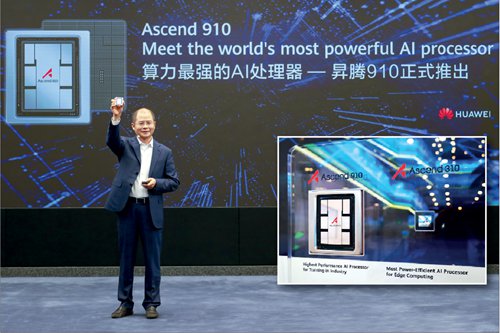
Eric Xu Zhijun, Huawei's rotating chairman, announces the release of the Ascend 910 AI processor and MindSpore AI computing framework on Friday. Photo: Courtesy of Huawei
Chinese telecom giant Huawei on Friday again showed its defiance in the face of what is widely believed to be a politically motivated crackdown by the US government, as it released what it claims to be the world's most powerful artificial intelligence (AI) chip and laid out its ambitious roadmap in the critical sector.
Following a series of launches, Huawei's launch of the Ascend 910 chip offers another window into the company's technological prowess in key areas - from its smartphone operating system (OS) to chips - that could help the firm weather risks from the US. Huawei's move also elevated China to the forefront of the AI sector, analysts noted.
At its headquarters in Shenzhen, South China's Guangdong Province, Huawei launched the Ascend 910 AI chip, the latest version of its Ascend-max series designed for smart devices. Huawei said test results of the chip working with its own full-field AI computing framework showed that the chip is twice as efficient as other mainstream chips on the market.
"Without a doubt, it has more computing power than any other AI processor in the world," Eric Xu Zhijun, Huawei's rotating chairman, said at the event, where the company also revealed its roadmap for the AI sector. "Everything is moving forward according to plan, from R&D to product launch. We promised a full-stack, all-scenario AI portfolio. And today we delivered with the release of Ascend 910 and MindSpore. This also marks a new stage in Huawei's AI strategy."
The chips are only the beginning of Huawei's ambition to hold what it described as a full-stack, all-scenario AI portfolio. Huawei's AI portfolio includes its new Ascend series of AI chips - the world's first AI IP and chip series designed for a full range of scenarios, and it also includes new products and cloud services built on Ascend chip capabilities.
"As an industry giant that has so many business branches and lines, it's actually beating market expectations that Huawei could launch the chip so soon," Geng Bo, vice secretary-general of the China Solid State Lighting Alliance, a semiconductor industry association, told the Global Times on Friday.
Defiance under pressure
Coming just days after the US government stepped up its pressure on the Chinese firm, the move is also seen as a direct response to the US that it will not give in despite facing what its CEO Ren Zhengfei described as "a point of life or death."
The US Commerce Department on Monday added 46 additional affiliates of Huawei to its entity list, even as it was apparently forced to grant the Chinese firm another 90-day reprieve by rising domestic pressure.
"[Friday's launch of the Ascend 910] is like Huawei telling the world that the US will not be able to strangle Huawei's throat," said Jiang Junmu, chief writer at telecom industry news website c114.com.cn, who covers Huawei closely, pointing also to Huawei's earlier launches of other chips and the HarmonyOS.
Analysts said that the Ascend 910, which is well positioned to compete with chips from Intel, Qualcomm and Nvidia, also put China at a leading position in the global drive for AI, which had been dominated by other countries, particularly the US.
In continuing a defiant tone from Huawei executives over the US ban, Xu on Friday also brushed aside the potential impact of the US ban on the company's drive for AI, saying that the company has "gotten used to living with the ban."
"There's no need to adjust Huawei's businesses due to the 90-day extension, since we've completed all the adjustments before that," Xu told the Global Times on Friday.


